“Raggedy man ... good night.”Amy Pond, The Time of the Doctor
Considering the feral response to
The Time of the Doctor on social media in the last week,
Doctor Who fans seem more divided than ever. All the goodwill and euphoria that followed the 50th anniversary special
The Day of the Doctor evaporated within 24 hours, with
The Time of the Doctor either lauded or despised. The doomsday brigade of fans are already calling for a new showrunner, arguing that
Steven Moffat has “gone too far” (whatever that means!) and warning that if the program is allowed to continue “on a downward spiral” (whatever that also means!),
Doctor Who will be cancelled (never mind that the ratings are solid!).
Well, I’m here to assure the rest of us the rumours of
Doctor Who’s demise have been greatly exaggerated. If the TV program fades away in the next few years, it won’t be because of
The Time of the Doctor specifically or Steven Moffat’s apparent “megalomania”. Going into the ninth year since its revival, Doctor Who has already exceeded the average life span of other TV programs.
The Time of the Doctor gives the Time Lord – and the program – a kick-start. What more could fans have asked for?
Granted, the episode isn’t perfect – but even the best episodes of
Doctor Who across the ages have their flaws. The premise is sound – a horde of alien races besiege the planet Trenzalore to ensure that an age-old prophecy does not eventuate and the Doctor is forced to defend the planet’s hapless inhabitants in the crossfire and accept his own mortality. It is in the execution that the episode has its ups and downs. So what works and what doesn’t?
Much as part two of
The End of Time was a valedictory tour for
David Tennant’s Doctor, so this episode is a valediction for
Matt Smith’s Time Lord. The Silents, Weeping Angels, Sontarans, Cybermen and Daleks are present to give Smith’s Doctor a spectacular send-off – but with the exception of the Daleks and the Church of the Papal Mainframe (including the Silents), most of this menagerie of aliens and monsters are superfluous to the story. They did not all need to be explicitly shown, need only have been inferred in dialogue and some of the sequences that feature them could have been left on the cutting room floor in favour of more expository material and more interaction between the Doctor and Clara.
For example, the arrival of the Silents while Clara is waiting outside Tasha Lem’s chapel is effective in generating menace but it is ultimately unnecessary when we later learn they are the good guys! The random appearance of the Weeping Angels in the snow is also pointless (if ever there was a story in which the Angels should not have appeared, this was it!). The incursions by the Sontaran duo – basically an excuse for
Dan Starkey to reprise Strax twice over! – and the wooden Cyberman are also played up for comedy but otherwise add little to the story. The wooden Cyberman would have been ingenious in
The Next Doctor a few years ago but here it is about as useful as the puppet Monoid that we glimpse in the puppet show about the Doctor’s adventures!
What also doesn’t work (and which I believe is at the heart of many of the complaints about this episode) is the comedy in the first 20 minutes of the story. While the pre-titles sequence is amusing, I suspect the comedy would not be so predominant if this were a regular episode. It’s as if Moffat feels obligated to inject a lot of humour into the opening minutes of the story because it is a de facto Christmas special rather than just letting events unfold and adding lighter moments along the way. The Doctor appearing naked before Clara and her relatives is symptomatic of his madcap nature and you cannot help but laugh (even on repeated viewings) but otherwise this whole sequence could have been sacrificed (no religious pun intended!) for more mystery and drama. Nevertheless, kudos to artistes
James Buller,
Elizabeth Rider and
Sheila Reid who really look as if they are seeing a naked man when Matt Smith is fully dressed!
However, once the comedy settles down and we learn what the source of the mysterious distress signal reverberating throughout the cosmos is,
The Time of the Doctor is as exciting, dramatic and ambitious as expected. It is ironic that while the Time Lords and Gallifrey are not physically in the episode, the threat and opportunity their return signifies is more omnipresent than the menagerie of aliens and monsters that physically threaten the Doctor and Clara. Some things are better heard and felt but not seen – a brilliant tactic which
Doctor Who down the years has perfected. It is why the opening visuals to the episode are magnificent – the swarm of Dalek, Judoon, Sontaran, Cyberman, Silurian and Sontaran ships (amongst others) ranged against the Saturn-like planet of Trenzalore are undeniably impressive and say a lot more than showing a handful of monsters. It is why the visual of Tasha Lem’s proclamation of the siege of Trenzalore and vow that “silence will fall” (witnessed by Church devotees on floating platforms) is also virtually identical to the cliffhanger to part one of The End of Time (when the Time Lords were revealed for the first time in the modern series) – it emphasises how much the stakes have been raised in the quest for universal peace. It is why Tasha Lem’s description of how the distress signal generates “something overpowering ... pure, unadulterated fear” also hints at a threat possibly greater than the races besieging Trenzalore itself (despite the Doctor’s insistence, can we be sure the Time Lords’ intended return is benevolent and not vengeful?).
While some fans may also not buy into the story of an ages old conflict and the Doctor’s protection of a pre-industrialised society that does not seem to develop (or want to expand and grow), the story through Tasha Lem’s narration is convincing enough.
Orla Brady is impressive as the Mother Superious Tasha Lem, proving ambiguous enough (is she hero or villain – or a bit of both?) to keep you guessing about her motives right to the end of the episode. I suspect we haven’t seen the last of her.
As Steven Moffat said at the 50th anniversary celebrations in November, Matt Smith really acts his heart out, portraying an ageing Doctor in a stalemate with his greatest enemies. What still stands out about Smith’s Doctor even as he ages is his affinity with children. This has been constant since the Eleventh Doctor’s initial meeting with young Amelia Pond – and his interaction with Barnable in the episode is touching. It reinforces that deep down Smith’s Doctor is at heart(s) a big kid with an unending childlike thirst for life and adventure.
Smith’s transformation in the climactic minutes of the episode into an almost Hartnell-esque figure (at least in look) is extraordinary. It’s a performance tinged with regret and sadness but also full of humour and warmth. The transformation is symbolic of the program coming full circle. We’re back to the cranky, cantankerous yet sharply intelligent and brilliant old man that we first met 50 years ago in a junkyard. Who could argue that is not poetic?
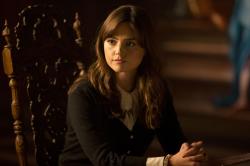
For the second time in as many episodes it is the companion who is again the game breaker. Clara’s monologue to the Time Lords is beautifully written by Moffat and delivered with great feeling and passion by
Jenna Coleman: “You’ve been asking the question but you lot have been getting it wrong! His name is the Doctor – all the name he needs, everything you know about him! And if you love him – and you should – help him! Help him!” It’s a fantastic performance from Coleman who again rises above the limitations of her character to deliver a solid performance. It shows what a great asset she is to
Doctor Who even when she doesn’t have much to do. Just imagine how good Coleman may be in the next season if Clara is given more to do!
This could have been a great episode for Clara. It’s a pity that one of the scenes deleted from the final broadcast features Clara telling the Doctor how much she misses him. It shows how affectionate their relationship is – well beyond the Doctor’s description of her as an “associate”. What is mentioned and goes unexplored are Clara’s feelings for the Doctor as well, particularly when the truth field indicates that she fancies him. “Oh no, not again!” you may be thinking. Nevertheless, this attempt at romance offers an interesting angle for the next series when
Peter Capaldi takes on the reins – how Clara copes with loving a much older incarnation of a man who will be less potential boyfriend material and more father figure.
Some fans have been livid about the divine intervention of the Time Lords in the climax – but what we get is a “MacGuffin” no different than the divine intervention of “Bad Wolf” Rose in
The Parting of the Ways (when the Doctor is also in a stand-off with the Dalek Emperor). The intervention is a truly magical moment (perhaps more magical because you know what’s coming!) and magic and wonder are things that are all too often missing from so-called SF and fantasy television nowadays. How can you not cheer at Smith’s performance when the Doctor, true to form, defies the rules once again?
Yet apparently the resolution goes too far for the fans condemning this episode. In 1977, when
The Deadly Assassin was broadcast, some fans whinged that
Robert Holmes’ portrayal of the Time Lords negated the earlier impressions of them as a seemingly benevolent, omnipotent, enigmatic and divine race of beings (as hinted in
The War Games and
The Three Doctors). Flash forward 36 years and now we’re complaining that the Time Lords are apparently benevolent, omnipotent, enigmatic and divine all over again and not the corrupt, incompetent bureaucrats Holmes made them out to be! It just shows there is no pleasing some and the program can never win!
I also don’t believe fans can complain too much about the way the Time Lords gifted the Doctor a whole new regeneration cycle. In my mind, just as I always thought it was inevitable the Time Lords would be revived in the series so it was destined that the Doctor one day would be granted a whole new lease of life. I was never sure how this would be achieved and I certainly did not expect it to be resolved so quickly (after all, for most of 2013 we thought the Doctor still had two regenerations in reserve!) but having now seen it happen in
The Time of the Doctor I could not envisage it happening any other way. OK, maybe the science of it doesn’t make sense but
Doctor Who has never made sense scientifically. What has mattered is the sentiment behind it – and we see that in Smith’s brilliant final moments.
Smith delivers a confident, philosophical, fitting and touching monologue for his Doctor and the character of the Time Lord overall: “We all change when you think about it. We’re all different people – all through our lives. And that’s OK, that’s good, you’ve got to keep moving, so long as you remember all the people that you used to be. I will not forget one line of this, not one day, I swear. I will always remember when the Doctor was me.”
Smith’s discarding of the bow tie is a poignant touch. There is none of the petulant, self-indulgent and indecorous ranting of the Tenth Doctor’s departure in Smith’s final moments (as powerful as David Tennant’s performance was in
The End of Time, the Tenth Doctor’s departure seems disingenuous in hindsight now we know he was too vain to fully regenerate in
Journey’s End!). Smith’s departure is dignified, accommodating and affectionate – coming from a Time Lord whose incarnation has survived for over a millennium and has accepted his time is up.
My only major disappointment with the episode is the entrance of Peter Capaldi’s Doctor which is underwhelming, visually and in the dialogue. Even allowing for the fact that the regeneration began 10 minutes earlier, the transformation from Smith to Capaldi isn’t as visually exciting as the Eccleston/Tennant and Tennant/Smith transitions. It is almost a “blink and you’ll miss it” moment. As for Capaldi’s first line as the Doctor: “Kidneys!” Seriously? It’s on a par with Colin Baker’s parting words of “Carrot juice! Carrot juice!” Maybe Moffat thought it would be funny but it falls flat after such a magnificent farewell for Smith. Fortunately this will not impact on Capaldi’s Doctor – I expect he will be brilliant in the role and an actor of his calibre will rise above the quality of the material that he is given - good or bad!
The Time of the Doctor is not perfect but is a dramatic and in parts stirring conclusion to Matt Smith’s era. Moffat in a passage of exposition between the Doctor and Tasha Lem manages to tie up many of the loose ends from Smith’s first few seasons in his fashionably “wibbly wobbly, timey wimey” way: the Pandorica/crack in time, the Order of the Silence, Trenzalore and Gallifrey Falls No More. It is difficult to know whether Moffat had a masterplan from the beginning or if he has made it all up as he goes along! Nevertheless, most of the jigsaw pieces fall into place, even if the execution in parts of this episode seem clumsy and there are still some “timey wimey” questions and potential paradoxes in play (eg is Clara still the “Impossible Girl”?).
Significantly,
The Time of the Doctor is a watershed episode. Just as the return of Gallifrey established exciting possibilities at the end of The Day of the Doctor, the Doctor’s new lease of life in
The Time of the Doctor gives not just the title character but the show itself a fantastic opportunity to renew and rejuvenate itself. The Capaldi Doctor is not just the 12th Doctor – he is now the first Doctor in a whole new regeneration cycle.
What better gift could fans have asked for in the program’s 50th anniversary year? Yet judging by the feral reaction of some to this episode in blogs and social media, you’d be forgiven for thinking they want to see the demise of the show! Oh well, winners (the Doctor) are grinners and losers (disaffected fans) can please themselves. There’s always Moffat’s
The Curse of Fatal Death as an alternative of how the Doctor cheats death - etheric beam locators and all!
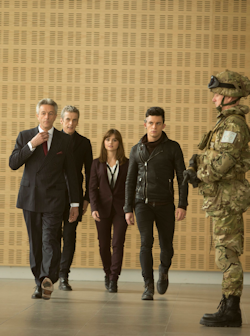
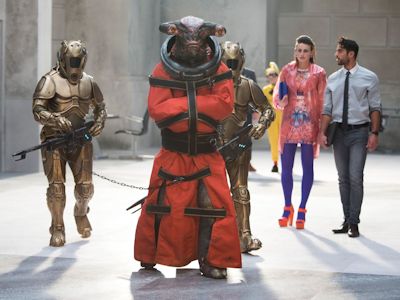 The Teller's main role as a brain eater is sufficiently scary and memorable. However there is no question that the most malicious and cruel antagonist is villainess Miss Delphox - played by Keeley Hawes (Ashes to Ashes). We are even led to have sympathy for the monster, as it is harnessed to cause damage to enemies of the Bank, by being kept in either chains or in a form of cocoon. Furthermore Delphox manipulates the Teller to dispose of a nuisance individual or two and describes the action as 'account deleted' and generally struts about the Bank giving out orders in a nonchalant way. Evidently the Doctor will have to use his keenest wits to come up with a solution against such an antagonist.. except the finale has a twist where our Time Lord icon gets help from the most unlikely of sources.
The Teller's main role as a brain eater is sufficiently scary and memorable. However there is no question that the most malicious and cruel antagonist is villainess Miss Delphox - played by Keeley Hawes (Ashes to Ashes). We are even led to have sympathy for the monster, as it is harnessed to cause damage to enemies of the Bank, by being kept in either chains or in a form of cocoon. Furthermore Delphox manipulates the Teller to dispose of a nuisance individual or two and describes the action as 'account deleted' and generally struts about the Bank giving out orders in a nonchalant way. Evidently the Doctor will have to use his keenest wits to come up with a solution against such an antagonist.. except the finale has a twist where our Time Lord icon gets help from the most unlikely of sources.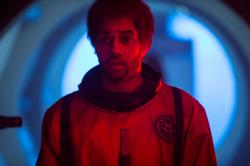
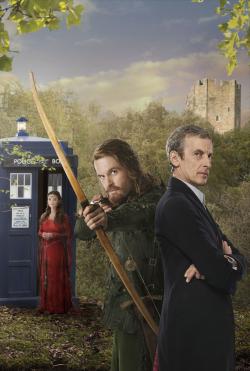
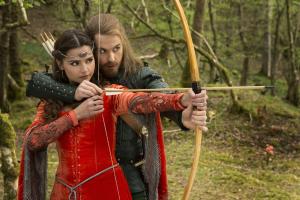
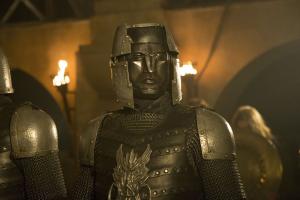 The episode has a lot of snappy elements to enjoy. One of the really funny moments involves a contest to find the best archer in land. The Doctor's marksmanship being top-notch somehow feels right for the Twelfth Doctor, and it is good to see him with a weapon other than sonic screwdriver .. for a few moments anyway. The prize of the golden arrow is tied into plot well, making this sequence not only entertaining but also key to the story. Less positively some dialogue comes off as cod-mediaeval, reminding me of '
The episode has a lot of snappy elements to enjoy. One of the really funny moments involves a contest to find the best archer in land. The Doctor's marksmanship being top-notch somehow feels right for the Twelfth Doctor, and it is good to see him with a weapon other than sonic screwdriver .. for a few moments anyway. The prize of the golden arrow is tied into plot well, making this sequence not only entertaining but also key to the story. Less positively some dialogue comes off as cod-mediaeval, reminding me of '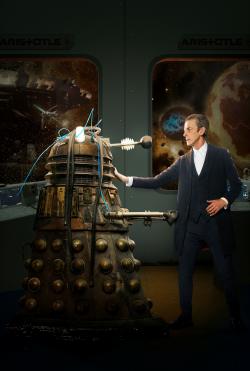
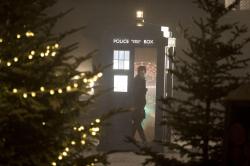
 For the second time in as many episodes it is the companion who is again the game breaker. Clara’s monologue to the Time Lords is beautifully written by Moffat and delivered with great feeling and passion by
For the second time in as many episodes it is the companion who is again the game breaker. Clara’s monologue to the Time Lords is beautifully written by Moffat and delivered with great feeling and passion by 






